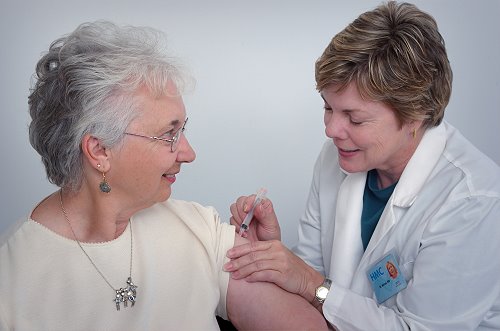Medicare has been running a home health initiative for as long as it’s been in existence, but how exactly does one take advantage? You might be asking yourself the same question if you or an elderly loved one has recently been discharged from a hospital after falling ill. Well, you’ve come to the right place — read on for a detailed guide into Medicare’s coverage of in-home care.
What is Medicare Home Health Care?
Medicare home health care is an initiative that allows beneficiaries to receive medical services in their own residences.  Medicare’s coverage is intended primarily for in-patient care. However, the program acknowledges the unique benefits afforded by in-home care; the ability to recover in a more familiar environment, more personalized care, less strain on hospital infrastructure, etc. Needless to say, it’s the elderly who stand to gain the most from home health care. And it is for this reason that Medicare, the principal insurer for people over the age of 65, extends the home health to all its enrollees.
Medicare’s coverage is intended primarily for in-patient care. However, the program acknowledges the unique benefits afforded by in-home care; the ability to recover in a more familiar environment, more personalized care, less strain on hospital infrastructure, etc. Needless to say, it’s the elderly who stand to gain the most from home health care. And it is for this reason that Medicare, the principal insurer for people over the age of 65, extends the home health to all its enrollees.
Even so, Medicare only covers services “when there’s a skilled health care need following hospitalization or decline in wellbeing.” This implies that coverage is limited to services provided by skilled practitioners and therapists with the goal of managing an ongoing illness and/or injury. Services that are non-medical in nature, while forming a crucial part of the recovery process, are generally not covered by Medicare.
In essence, Medicare’s coverage is significantly limited in scope. The majority of beneficiaries end up having to foot a fraction of their expenses, and you too probably will. That is, if you’re eligible to receive coverage in the first place — there are certain requirements you’ll need to pass. We’ll delve deeper into those shortly, but let’s first see the parts of your home care routine that qualify, and the ones that don’t.
What In-home Care Services Does Medicare Cover?
The Medicare website outlines the in-home care services covered by Parts A and B as the following:
-Skilled nursing services: This refers to care that facilitates recovery from injury/illness, but which can only be administered by a qualified practitioner (specifically a Registered Nurse or Licensed Practical Nurse). Some common examples here include: injections, wound dressing, catheter changes, feeding tube maintenance, and administration of intravenous shots.
-Skilled therapy services: Medicare’s in-home care coverage extends to therapies administered to restore bodily function in the wake of debilitating illness/injury. These include occupational, physical and speech-language pathology. In each case, services can be provided by a licensed therapist or under their supervision.
-Nutritional care: While this isn’t a medical service per se, it may be covered if your doctor deems it necessary. A registered dietitian will be referred to supervise your diet and ensure you’re living in the right conditions.
-Medical supplies: Medicare caters for all supplies related to the patient’s condition as ordered by a doctor. Coverage could also extend to equipment prescribed for in-home use (e.g. wheelchairs and walkers). It should be noted that Medicare doesn’t foot the bill in full for the latter; patients are responsible for 20% of the approved amount, plus any remaining deductible under Part B.
-Medical social services: Medicare covers socio-emotional support services offered by a licensed counselor or social worker. The services must be prescribed as part of treatment for illness, and offered hand-in-hand with skilled nursing care.
-Safety services: This includes all services provided to patients in a non-ambulatory state (i.e. without the ability to walk or move around). Such patients rely on safety aides to maintain a safe environment and ensure assisted movements don’t worsen their condition.
It must be noted that all these services are usually covered on an intermittent (or part-time) basis. Medicare defines ‘intermittent’ as less than 8 hours a day, and no more than 21 days each month. This window may be extended if, according to your doctor, your condition is likely to improve within a reasonable and precise time frame. The weekly maximum amount of hours can also be extended to 35 but in rare circumstances.
In a nutshell, Medicare does not cover full-time nursing care. Other aspects that fall outside the home health care initiative include:
-Custodial care: You will recall that Medicare does not pay for non-skilled care services. These include everything from feeding to personal grooming — all fall within the broad category of custodial care. This is only catered for when a doctor deems it necessary to improve your condition. Even then, you must be receiving skilled nursing services in conjunction with custodial care; Medicare won’t cover it if it’s the only thing you need.
-Homemaker services: This encompasses activities like cleaning, laundry and shopping. Like with the above, homemaker services can be covered if your doctor recommends it.
-Meal delivery: Under no circumstances will you be covered for the cost of having meals delivered to your home — not even when your mobility is severely limited.
How Does One Qualify for Medicare Home Health Care?
Medicare will cover your in-home care if you’re enrolled in Part A or B, as highlighted before. Of course, you cannot simply choose to have your needs attended to at home. You must first pass the eligibility test by meeting the following conditions:
-Be homebound: The disorder you’re suffering from must have rendered you homebound in accordance with the criteria set by the Center for Medicare & Medicaid (CMS). In this state, your mobility will be impaired to the extent of having to rely on another person to get around. You can still be considered homebound even if you’re able to leave home. This happens when the doctor believes that your condition could worsen with travel, and indicates so on your discharge documents.
-Be under a doctor’s care: Medicare states that coverage is only available for services offered under a plan of care established and reviewed regularly by a licensed, qualified physician. For that reason, you must be under the care of such a doctor to be eligible. They (your doctor) must prescribe a treatment plan that includes in-home care.
-Be in need of services: To reiterate the above point, your care needs must be confirmed through a home health certification signed by your doctor. The certification should declare whether you need skilled nursing care, skilled therapy care, or a combination of both. Your nursing plan will need to outline how often you need these services, supplies required, and expected outcomes.
-As part of the certification, patients are required to have a face-to-face meeting with a medical professional. This should be directly related to your care needs. ‘Face-to-face’ in this context implies a visit to the practitioner’s office or hospital, but meetings facilitated by video conferencing are also allowed in certain circumstances. No matter the case, the meeting should take place inside the 120-day window surrounding the day your care program starts (specifically, 90 days before or 30 days after it commences).
-Finally, Medicare will only pay for services provided by an accredited home health agency (HHA).
So, What Now?
You’ve just found out you qualify for Medicare-covered home services — what’s the next step towards cashing in? You will need to find an agency. Your doctor will likely recommend one when signing off your plan of care.
This, however, doesn’t place any obligations on your part — feel free to look for another agency if you so wish. Geography aside, your choices can only be limited by your insurance coverage. Medicare Advantage Plans require beneficiaries to use agencies they contract with.
Picking a Provider
It must be stated that not all agencies offer similar services. Some offer the whole range, but most prefer to specialize in one or two categories. As such, you might have to enlist with multiple providers to get all your needs catered for. Be sure to check out Medicare’s Home Health Comparison tool at www.medicare.gov/HHCompare. With it, you’ll be able to compare different agencies based on services offered and quality of care.
Also, keep in mind that ‘agency’ in this context refers strictly to a certified provider — caution must be exercised to avoid falling for scams. To be on the safe side, you will want to check the following when interviewing potential providers:
-Whether they’re licensed to operate in your state, and approved by Medicare
-The extent to which they screen their employees.
-The kind of progress reports you should expect for each service
-The availability of staff to assist you during an emergency.
-Reviews from others who have relied on the company’s services
Boca Home Care Inc. is a licensed, Certified Medicare Home Care Agency, established in 2005, and serving all of Palm Beach County, Florida.
Call us at: 561-989-0441
Your Rights As a Beneficiary
Everyone who receives Medicare-covered in-home services enjoys certain rights and protections. You are, for instance, entitled to appoint a legal guardian to act on your behalf if you’re incapacitated. The agency is also obligated to send you a copy of the nursing plan, and involve you in decisions concerning your routine. Speaking of, any services provided outside the approved plan will need to be covered out of pocket. These must be outlined to you in writing, along with their respective costs. Patients also have the right to file complaints regarding the quality of care.
